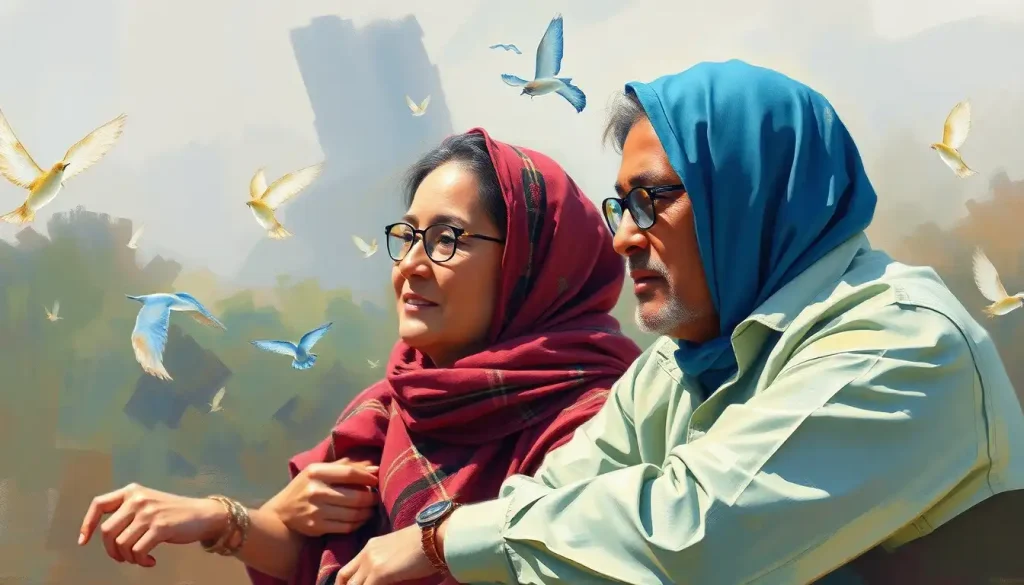From gleaming skyscrapers to billion-dollar deals, Dubai has transformed itself from a desert outpost into a powerhouse of global finance that rivals London, New York, and Singapore. This remarkable metamorphosis has positioned the city as a beacon for investment banking, attracting financial titans and ambitious professionals from around the world. The rise of Dubai as a financial hub is a testament to its strategic vision, innovative policies, and unwavering commitment to economic growth.
The Birth of a Financial Oasis
The story of investment banking in Dubai is one of rapid evolution and audacious ambition. In just a few decades, this sun-soaked emirate has rewritten the rules of global finance, carving out a niche that combines Western financial expertise with Islamic banking principles. It’s a heady mix that has proven irresistible to investors and institutions alike.
But how did this transformation occur? The seeds were sown in the early 2000s when the UAE government recognized the need to diversify its economy beyond oil. They understood that to secure a prosperous future, they needed to create a robust financial sector that could compete on the world stage.
Enter the Dubai International Financial Centre (DIFC). Established in 2004, this free zone became the cornerstone of Dubai’s financial ambitions. With its own independent regulatory framework and court system based on English common law, the DIFC offered a familiar and secure environment for international financial institutions to set up shop.
A Regulatory Framework Built for Success
The success of investment banking in Dubai owes much to its regulatory environment. The UAE Central Bank and the Dubai Financial Services Authority (DFSA) have worked tirelessly to create a framework that balances innovation with stability. This approach has paid dividends, instilling confidence in investors and institutions alike.
But it’s not just about rules and regulations. The UAE government has shown a remarkable willingness to adapt and evolve. Take, for example, the recent overhaul of the country’s commercial companies’ law, which now allows 100% foreign ownership in most sectors. This move has opened up new avenues for investment and M&A activity, further cementing Dubai’s position as a global financial hub.
Where East Meets West: The Unique Appeal of Dubai’s Investment Banking Scene
What sets Dubai apart from other financial centers is its unique position at the crossroads of East and West. This geographical advantage has allowed it to become a bridge between different financial worlds, offering opportunities that are hard to find elsewhere.
One area where this is particularly evident is in Islamic finance. Dubai has emerged as a global leader in Sharia-compliant banking and investment products, tapping into a market worth trillions of dollars. This expertise in Islamic finance has become a major draw for investors from Muslim-majority countries, as well as Western institutions looking to diversify their portfolios.
But it’s not all about Islamic finance. Dubai’s investment banking scene is remarkably diverse, covering everything from traditional mergers and acquisitions to cutting-edge fintech solutions. This diversity is reflected in the range of institutions that call Dubai home, from global giants like Goldman Sachs and Morgan Stanley to regional powerhouses like Emirates NBD and Mashreq Bank.
The Titans of Dubai’s Financial Landscape
Speaking of institutions, let’s take a closer look at some of the major players shaping Dubai’s investment banking sector. On the international front, heavyweights like JP Morgan, Citigroup, and HSBC have established significant presences in the emirate, drawn by its strategic location and business-friendly environment.
But it’s not just the global giants making waves. Local and regional banks have also stepped up their game, with institutions like Emirates NBD and First Abu Dhabi Bank building formidable investment banking divisions. These homegrown players bring a deep understanding of the local market, combined with international expertise.
Then there are the boutique firms, carving out niches in specialized areas like tech startups or renewable energy. These smaller players often punch above their weight, leveraging their agility and local knowledge to compete with their larger rivals.
The Art of the Deal: M&A in the UAE
Mergers and acquisitions (M&A) activity has become a cornerstone of Dubai’s investment banking scene. The emirate has witnessed a flurry of high-profile deals in recent years, spanning sectors from technology to real estate.
One of the most notable trends has been the rise of cross-border transactions. As UAE companies look to expand their global footprint, they’re increasingly turning to M&A as a growth strategy. This has created exciting opportunities for investment bankers, who play a crucial role in facilitating these complex deals.
But it’s not just outbound M&A that’s booming. Dubai’s stable political environment and strong economic fundamentals have made it an attractive destination for foreign investors looking to gain a foothold in the Middle East market. This inflow of foreign capital has further fueled the M&A boom, creating a virtuous cycle of investment and growth.
Going Public: The IPO Landscape in Dubai
Initial Public Offerings (IPOs) have become another key pillar of Dubai’s investment banking sector. The emirate’s stock exchanges, including the Dubai Financial Market (DFM) and Nasdaq Dubai, have seen a steady stream of listings in recent years.
What’s particularly interesting is the diversity of these IPOs. From state-owned enterprises to family businesses and tech startups, a wide range of companies are choosing to go public in Dubai. This diversity reflects the broader economic transformation underway in the UAE, as the country moves away from its reliance on oil and gas.
The success of these IPOs has not gone unnoticed. Best Cities for Investment Banking: Top Global Financial Hubs increasingly feature Dubai prominently, recognizing its growing importance in the global financial landscape.
Islamic Finance: A Unique Selling Point
No discussion of investment banking in Dubai would be complete without mentioning Islamic finance. This sector has become a major differentiator for Dubai, setting it apart from other global financial centers.
Islamic finance, which adheres to Sharia principles, prohibits interest and speculative activities. Instead, it focuses on profit-sharing and real asset-backed transactions. This approach has gained traction not just in Muslim-majority countries, but also among Western investors looking for ethical investment options.
Dubai has positioned itself at the forefront of this growing sector. The emirate is home to numerous Islamic banks and financial institutions, and has developed a robust regulatory framework for Sharia-compliant products. This expertise in Islamic finance has become a major draw for investors and institutions from around the world.
The Human Factor: Talent in Dubai’s Banking Sector
Behind every successful deal and transaction are the people who make it happen. Dubai’s investment banking sector has become a magnet for top talent from around the world, drawn by the opportunity to work on high-profile deals in a dynamic environment.
The Investment Banker Salary in Dubai: Exploring Lucrative Opportunities in the Financial Hub is another major draw. Competitive compensation packages, combined with the UAE’s tax-free status, make Dubai an attractive destination for finance professionals.
But it’s not just about attracting talent – retaining it is equally important. Dubai’s investment banks are investing heavily in training and development programs, nurturing the next generation of financial leaders. This focus on talent development is crucial for the long-term sustainability of Dubai’s financial sector.
The Tech Revolution: Fintech in Dubai
Like other global financial centers, Dubai is in the midst of a fintech revolution. The emirate has embraced technological innovation, recognizing its potential to transform the financial sector.
From blockchain and cryptocurrencies to AI-powered trading platforms, Dubai’s investment banks are at the forefront of financial innovation. The government has played a key role in fostering this innovation, creating initiatives like the DIFC FinTech Hive to support startups and encourage collaboration between traditional banks and fintech firms.
This embrace of technology is not just about staying competitive – it’s about redefining what’s possible in finance. Dubai’s investment banks are using technology to create new products, streamline processes, and reach new markets. It’s an exciting time to be in finance in Dubai, with the lines between traditional banking and technology becoming increasingly blurred.
Challenges and Opportunities: Navigating the Future of Investment Banking in Dubai
Of course, no industry is without its challenges, and Dubai’s investment banking sector is no exception. The global economic uncertainty, regulatory changes, and geopolitical tensions all pose potential hurdles.
However, these challenges also present opportunities. Dubai’s strategic location and stable political environment make it an attractive safe haven for investors looking to navigate uncertain times. The emirate’s commitment to diversification and innovation positions it well to adapt to changing market conditions.
Moreover, Dubai’s investment banking sector is playing a crucial role in the UAE’s broader economic transformation. As the country moves towards a knowledge-based economy, investment banks are facilitating the flow of capital into new sectors like technology, renewable energy, and healthcare.
The Road Ahead: Dubai’s Vision for the Future
Looking ahead, the future of investment banking in Dubai looks bright. The emirate has set ambitious goals for itself, aiming to become one of the top five global financial centers by 2025.
To achieve this goal, Dubai is doubling down on its strengths. It’s further developing its expertise in Islamic finance, investing in cutting-edge technology, and continuing to create a business-friendly environment that attracts global talent and capital.
But perhaps most importantly, Dubai is thinking beyond traditional banking. It’s positioning itself as a hub for new financial paradigms, from sustainable finance to digital currencies. This forward-thinking approach ensures that Dubai will remain at the forefront of global finance for years to come.
The Global Perspective: Dubai in the World of Finance
As we consider Dubai’s place in the global financial landscape, it’s worth comparing it to other major centers. While Investment Banking UK: Navigating the Financial Landscape in Britain and Investment Banking in Miami: A Thriving Financial Hub in the Sunshine State have their own unique strengths, Dubai offers a compelling proposition with its blend of Eastern and Western influences.
Similarly, while Africa Investment Banking: Opportunities and Challenges in a Growing Market presents exciting opportunities, Dubai’s more established infrastructure and regulatory framework give it an edge in certain areas.
Beyond Banking: The Broader Financial Ecosystem
It’s important to note that investment banking doesn’t exist in isolation. Dubai’s success in this sector is closely tied to its broader financial ecosystem. For instance, Private Equity in Dubai: Navigating Opportunities in the Middle East’s Financial Hub has seen significant growth in recent years, complementing the investment banking sector.
Similarly, Dubai Private Equity Jobs: Navigating Opportunities in a Global Financial Hub have become increasingly sought after, reflecting the diversification of Dubai’s financial sector.
The Human Element: Career Opportunities in Dubai’s Financial Sector
For those considering a career in finance, Dubai offers exciting prospects. Investment Banking Jobs in Dubai: Opportunities and Insights for Aspiring Professionals are plentiful and diverse, ranging from entry-level analyst positions to senior executive roles.
What sets Dubai apart is the opportunity to work on truly global deals. In a single day, you might find yourself working on a merger between two Middle Eastern tech startups, advising a Chinese company on its expansion into Africa, and structuring a Sharia-compliant bond for a European client. This global exposure is hard to match in other financial centers.
Lessons from Other Markets
While Dubai has carved out its own unique path, it can still learn from other markets. For instance, Investment Banking in Florida: Opportunities and Trends in the Sunshine State has shown how to leverage local strengths (in Florida’s case, its ties to Latin America) to create a distinctive value proposition.
Similarly, Investment Banking in Detroit: Navigating Financial Services in the Motor City demonstrates the importance of sector specialization. Just as Detroit has leveraged its automotive heritage, Dubai could further capitalize on its expertise in areas like logistics and tourism.
The Final Analysis: Dubai’s Place in Global Finance
As we conclude our exploration of investment banking in Dubai, it’s clear that the emirate has established itself as a major player in global finance. Its unique blend of East and West, its embrace of both traditional and Islamic finance, and its commitment to innovation have created a financial ecosystem unlike any other.
For investors, Dubai offers access to fast-growing markets and unique investment opportunities. For financial professionals, it provides a dynamic environment to build a truly global career. And for the UAE itself, the thriving investment banking sector is a key driver of its economic diversification strategy.
As Dubai continues to evolve and grow, it’s poised to play an even more significant role in shaping the future of global finance. From pioneering new financial products to facilitating cross-border deals, Dubai’s investment banks are at the forefront of financial innovation.
The journey from desert outpost to global financial powerhouse has been remarkable. But for Dubai, this is just the beginning. With its ambitious vision and unwavering commitment to excellence, the emirate is well-positioned to write the next chapter in the story of global finance. The future of investment banking in Dubai is not just bright – it’s dazzling.
References:
1. Dubai International Financial Centre (DIFC). “DIFC 2.0: The Future of Finance”. Annual Report 2020.
2. UAE Central Bank. “Financial Stability Report 2021”. https://www.centralbank.ae/en/publications
3. PwC Middle East. “Middle East Capital Markets Watch 2021”.
4. McKinsey & Company. “Global Banking Annual Review 2022”.
5. S&P Global. “Islamic Finance Outlook 2022 Edition”.
6. Dubai Financial Services Authority (DFSA). “Business Plan 2021/2022”.
7. World Bank Group. “Doing Business 2020: Comparing Business Regulation in 190 Economies”.
8. International Monetary Fund (IMF). “United Arab Emirates: 2021 Article IV Consultation”.
9. Deloitte. “Middle East Financial Services Industry Outlook 2022”.
10. KPMG. “UAE Banking Perspectives 2021”.












Would you like to add any comments? (optional)